Pocket Gamer might be able to lay a claim to being an early believer in mobile gaming - indeed, March 2015 marked the site's 10-year anniversary - but there were people laying the groundwork even before that.
By the time Pocket Gamer graced the internet in 2006, Sheffield-based Distinctive Developments had already been making mobile games since 2001.
So, how did this modest UK studio find itself among the first to jump head-first into mobile game development?
Two's company
It started at the Rotherham-based Krisalis Software, where Distinctive co-founders Nigel Little and Keith Birkett met and established a good working relationship.
Deciding to break away from Krisalis in 1994, which was primarily developing Amiga and Atari ST games at the time, the pair felt confident that they could find success by setting up a company and going it alone.
And so Distinctive Developments was born, although with one notable omission: the man described by Little as “the best artist at Krisalis,” Neil Adamson.
With Adamson deciding at the last minute that it presented too great a risk, the loss meant that Distinctive had to begin life as a two-man studio - and one lacking in the artistic department.
“It ended up being just two programmers who formed the company, which led to some problems in terms of the sorts of games we could produce,” laughs Little.
Being just two programmers limited the sorts of games we could make.Nigel Little
But the pair found a steady flow of conversion work nonetheless, including a port of the coin-op fighter Primal Rage for Atari Jaguar, Sega Saturn, and the 3DO.
“This was even before the PlayStation arrived,” Little reflects.
Several versions of Bust-a-Move for Nintendo 64 followed, along with ports of Lemmings for PlayStation, and various other projects of which Little's memory is hazy - this was over a decade ago, after all.
Growing pains
But the diminutive Distinctive was already punching above its weight, despite humble surroundings.
“Like many developers, we set up in my parents' house,” Little explains.
“I do remember times when we'd have people come over from Time Warner in the States, and we'd have to meet them at this house in suburban Sheffield. That was an experience.”
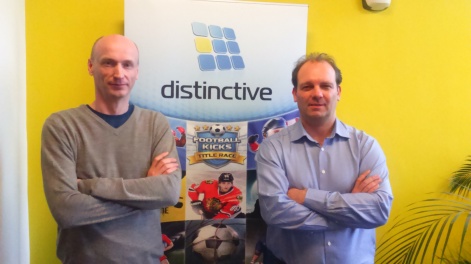
In its time as a console developer, Distinctive peaked at 8 people. It also moved out of the suburbs and into the Sheffield city centre, where it's been based ever since.
Distinctive found itself at a crossroads.
Having been content to sustain itself on work-for-hire console projects from 1994 to 2000, Distinctive found itself at something of a crossroads with the launch of the PlayStation 2 and the inevitable increase in team sizes that brought.
“We realised pretty early on that we didn't have the resources to do anything significant on the platform,” says Little.
New frontier
Naming interactive TV and online games as the other new directions it also considered, it was the fact that programmable feature phones were on the horizon that swung Distinctive's decision in favour of mobile.
This development would allow the team to create much more fully-featured experiences than the “absolutely terrible” WAP games, in which it had no interest.
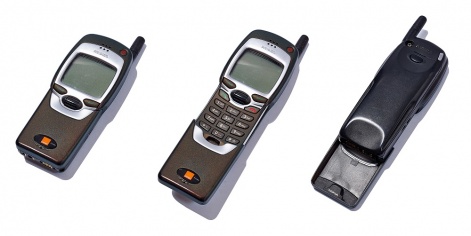
But while programmable phones removed many of the limitations of mobile game development, plenty still remained.
“The devices were just so limited,” says Little. “The performance of them, the size of the screens, the keys that were never designed to control games.”
There was also terrible fragmentation: “Java was supposed to be a standard, but each device implemented it slightly differently.”
Ingenuity through limitation
This fragmentation was so massive, in fact, that it informed entire structure of Distinctive's business.
We struggled with the shift in the business to smartphones... we were entirely set up for feature phones.Nigel Little
The Sheffield headquarters would settle on making the game for about ten different devices, covering various screen sizes and performance levels. Then, offices in the US and Poland would port it to all other devices.
“On top of that, each operator had their own testing criteria,” explains Little, recalling the seemingly arbitrary and contradictory rules imposed by each carrier that led to games being accepted by one and rejected by another.
The feature phone era was Distinctive's peak, with the firm reaching “about 45 people” across three offices worldwide.
However, as with all feature phone developers, the birth of the smartphone transformed this.
“We struggled with the shift in the business,” recalls Little. “We were entirely set up for feature phone games, meaning it would cost a lot of money to change focus.”
But shift it did, streamlining its operations to just the Sheffield headquarters and now "starting to grow again."
Freedom to develop
However, despite this, Little believes that all the changes that have occurred in the mobile games industry since the launch of the iPhone have positively impacted the quality of the games.
“We're glad [feature phone development] disappeared, because it wasn't about making the game as such - it was about process and bureaucracy.”
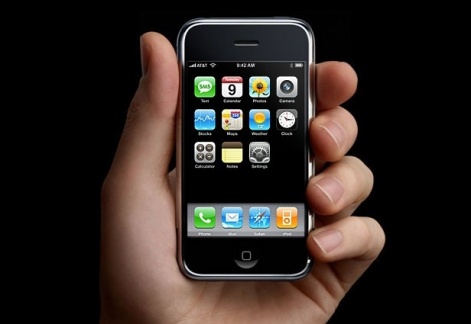
Competition just pushes the creativity forward and results in better games.Nigel Little
“I remember going to the first GDC where they had a mobile special interest group, and it was literally about 10 people in a room - that was the mobile games industry at that point,” he goes on.
“Fast forward to GDC in 2010/2011, there were just thousands and thousands of people turning up… But that [competition] just pushes the creativity forward and results in better games.”
For Distinctive, which found itself thrust into a newly-crowded mobile market unfamiliar to the one it had once knew, finding a niche was the key.
Consistency and clarity
It sensibly settled on sports, having developed the feature phone versions of FIFA Football for many years. It then, narrowing its focus further, targeted those historically under-represented in games.
Rugby and ice hockey were those sports, and two that have remained firmly of interest to Distinctive ever since.
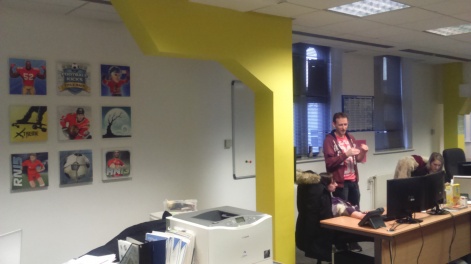
Rugby Nations '09 was the studio's first smartphone game, and the series is still ongoing with a 2016 entry recently launched.
Distinctive's clarity and consistency of vision over a 7-year period is almost unparalleled in mobile gaming
In this way, Distinctive's clarity and consistency of vision over a 7-year period is almost unparalleled in the world of mobile gaming.
That's not to say that nothing has changed at Distinctive, though.
One area in which it's definitely had to learn a thing or two is monetisation, as it transitioned from a premium model on feature phone and early smartphone to the near-ubiquitous free-to-play of modern mobile gaming.
Learning from mistakes
To demonstrate this, Little describes “a bit of a failure” called Bonecruncher Soccer. In it, the player would try to avoid slide-tackling defenders before flicking the ball goalwards.
“We took an objective view of the game and asked 'what is the most fun part?' We decided that was flicking the ball into the goal, so we got rid of everything else and made it into a separate game called Football Kicks,” he recalls.
“The first day we got 10,000 downloads. The next day 50,000, the day after 100,000. It kept going, until it was doing 250,000 downloads a day for several weeks. It just clicked with people.”
It's now at 26-27 million downloads, but its revenue potential was hampered by Distinctive's limited understanding of free-to-play in 2011.
The whole team has to understand F2P on a fairly deep level.Nigel Little
“Looking back, we could have really gone to town on monetisation - but unfortunately we didn't,” adds Little.
But the whole team has learned from that experience, and Little is now keen that everyone at the studio should have a good understanding of the free-to-play model.
“With Football Kicks, we essentially bolted on some monetisation at the end. It's tightly ingrained in the team throughout projects now,” he says.
“Free-to-play is not just about one person dictating 'this is how the game should be'; the whole team has to understand it on a fairly deep level, especially from a game design point of view.”
Best of both
Distinctive in 2016 may be almost unrecognisable from the makeshift, two-man company established in 1994, but one thing has remained consistent: work-for-hire projects.
However, while these were the company's bread and butter for the first few years, Little says that work-for-hire and self-publishing now “work in tandem” at the studio.
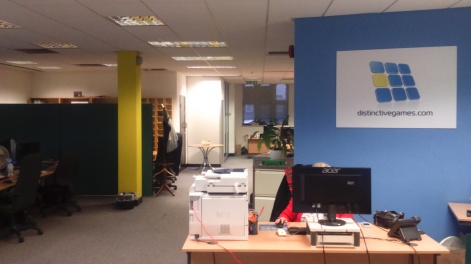
“We can test our theories on our own games, prove that they work, and then we can go to our work-for-hire clients with that insight,” he elaborates.
It's good sometimes to have creative output that is not a sports game.Nigel Little
The firm's main client is Square Enix, with whom it works on the rebooted-for-mobile Champ Man series, but it's also “working on some smaller projects with other clients.”
“We really enjoy working with Champ Man, and we want to be involved in making sure that there's a future for that game.”
More than sports?
But this does mean that, while the consistency is impressive, Distinctive is very much a sport-focused studio.
“The team is varied, they have a varying level of interest in sports, and it's good sometimes to have creative output that is not a sports game,” Little considers.
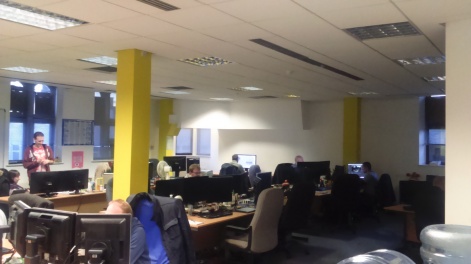
Downhill Xtreme, the world's first longboard racing game, is one example in Distinctive's back catalogue that strays at least from the world of traditional, team-based sports. A sequel is in development.
However, Dead Runner - a 3D, first-person endless runner set in a gloomy haunted forest - is the most obvious outlier, and one Little remembers fondly.
Received warmly - although perhaps “more critically than commercially” - he's keen not to rule out the prospect of similarly quirky, non-sports games arising from Distinctive in the future.
A creative environment
The firm encourages all staff members to feel free to generate ideas, and there's a good mixed of young and experienced creative talent at the studio.
It's been great to form relationships with various companies in the area, encouraging them to take all their opportunities.Nigel Little
Plenty of industry veterans remain in Sheffield from the days of Gremlin Interactive, and Little praises the quality of the game courses at local universities - a few graduates of which are now at Distinctive.
But Little is not inward-looking, and wants to make Distinctive an active part of the game development community in the region.
“We've been involved with Game Republic right from the very start, which is a trade association for game companies in the Yorkshire region, and it has encouraged other regions to create similar schemes,” he says.
“It's great for forming work relationships between the various companies in the area, and encouraging them to take advantage of all the opportunities that are around.”
And if any company knows about grasping opportunities, Distinctive - the firm that embraced mobile gaming in 2001, found its niche in a booming market, and adapted to F2P - is it.





















